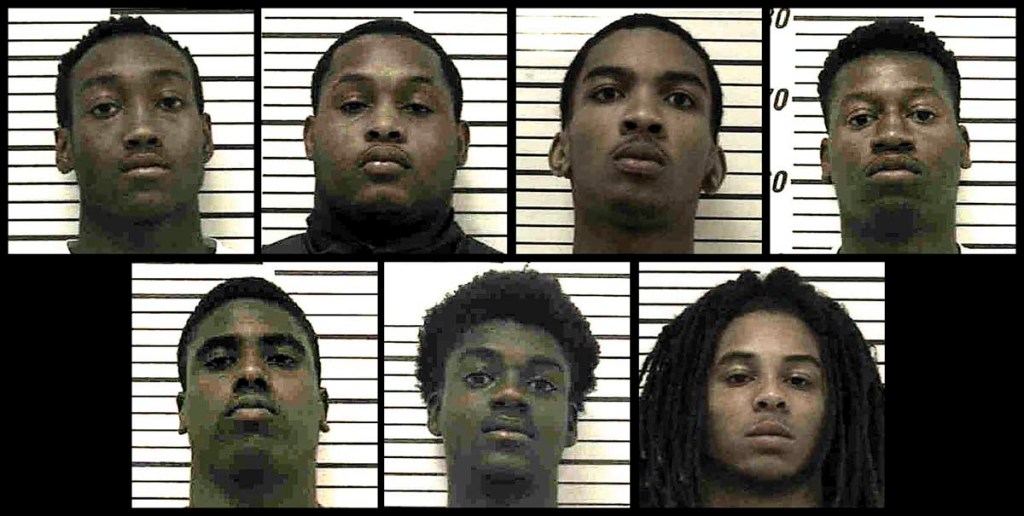Jury acquits Georgia teen on murder charge
Published 6:30 am Thursday, August 11, 2016

- Seven Colquitt County teenagers were charged with murder and other offenses in connection with the death of John Hester Sr. Top row, from left, are Adrian Lyryan Robinson, 19; Brandon Quanterrious “Brad” Wynn, 18; Christian Savion Glover, 18; and Derrick Demond Phillips, 18. Bottom row, from left, are I-Key Tumazs Pinkins, 18; Ty’Cameron La’Darius Hayes, 18; and Tykerious Raheem “Grumpy” Jones, 17.
MOULTRIE, Ga. — A teen accused of firing the shot that killed a south Georgia man last year was found not guilty of murder Wednesday.
Jurors did find that 19-year-old Christian Glover committed other crimes that day including burglary and the attempted home invasion that Colquitt County resident John Hester Sr., 68, is believed to have disrupted when he was shot.
Glover now faces the possibility of a lengthier prison sentence than his six co-defendants, who were offered plea agreements. He will be sentenced in October.
That was little solace to members of the Hester family, who were visibly shaken by the verdict.
Hester’s wife, Merle, who found her husband bleeding on their porch, said she was disappointed.
“He took everything from me,” she said of Glover. “I just thought for sure he would be found guilty of murder because he took a life and he destroyed mine and my family’s life.”
Hester died of a heart attack brought on by the gunshot wound, according to an autopsy. The couple was months away from their fiftieth wedding anniversary.
The shooting has gripped the community, in part because it involved former football standout Tykerious “Grump” Jones and two other former Colquitt County High School players.
The incident also alarmed the community because of the introduction of violence into an otherwise peaceful existence in rural Colquitt County.
Chief Assistant District Attorney Brad Shealy hit on the latter during closing arguments in court on Wednesday.
Shealy focused on Glover’s apparent involvement in a group called the “Reck Gang,” whom he described as “bad dudes,” and he urged the jury to send a message with its verdict.
He called Jones, who testified against Glover, as the gang’s leader. Jones said the burglary and attempted break-in at the younger Hester’s home were his idea.
“John Hester should not have died,” Shealy said. “But seven guys decided they want to go rob a place, and he’s dead.”
The group broke into another home earlier that day, stealing nearly two-dozen firearms and electronics. One of the stolen handguns, a .40-caliber Sig Sauer, is the gun that prosecutors say Glover used in the shooting.
The group met up again late that night to break into John Hester Jr.’s home, across the street from where his parents lived. This time, the group showed up armed and with T-shirts wrapped around their faces.
Hester was likely outside smoking a cigarette during a rain delay in a NASCAR race when he noticed suspicious activity at his son’s home. He was shot when he confronted the group, firing his shotgun four times.
All of the suspects were originally charged with murder. Glover’s six co-defendants pleaded guilty to reduced charges and identified him as the shooter. They now face up to 30 years in prison.
Shealy said jurors may have found that unfair.
“They just, I believe, and I haven’t spoken to them, wanted to treat them all the same,” he said.
Shealy said he didn’t regret offering plea agreements, though. He said he needed the others’ testimony to make the case against Glover, and much of the evidence against Glover relied on their statements.
Jones, who drove the car Glover rode in, was the only one who said he witnessed Glover fire shots at Hester.
Some of the others said Glover told them later, “I think I shot him.”
But key details, like the whereabouts of the gun, remained unclear.
An analysis of Glover’s cell phone also revealed only circumstantial evidence, such as a vague text exchange with his girlfriend just hours before his arrest.
The day after the shooting, Glover searched the internet for information about a Smith and Wesson .40-caliber handgun with a laser sight. Other than the model type, that matches the description of the stolen handgun.
Glover’s attorney, Karla Walker, told jurors that prosecutors were asking them to “make some leaps, make some inferences and do some good old fashioned reading between the lines.”
Walker said after the trial that she was pleased with the outcome, even though she had tried to clear Glover of all charges. She had argued that prosecutors lacked evidence tying Glover to any of the crimes.
Glover’s family declined to comment.
Jill Nolin covers the Georgia Statehouse for CNHI’s newspapers and websites. Reach her at jnolin@cnhi.com.





